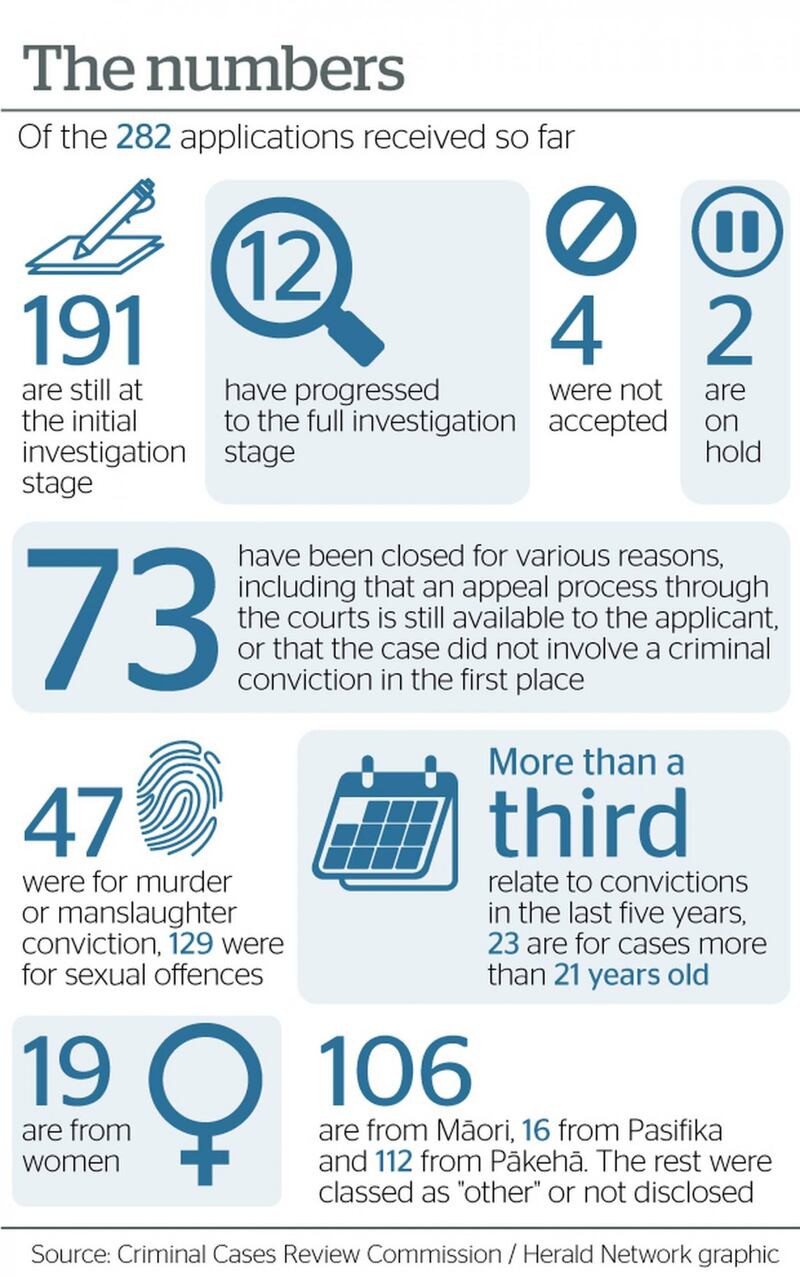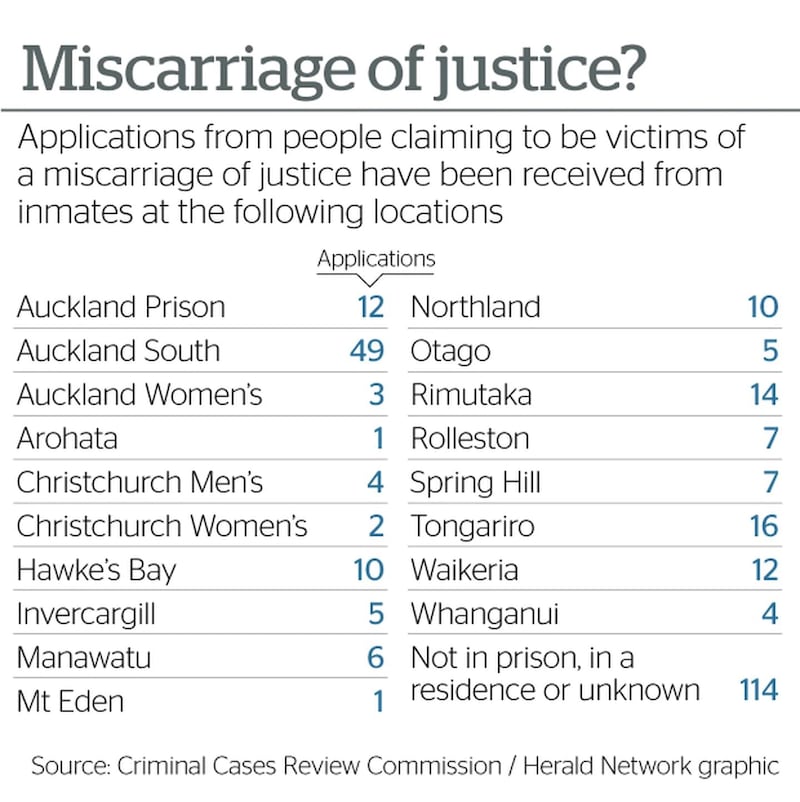A government-appointed commission investigating miscarriages of justice has been swamped by applications - but has yet to finish a single investigation after more than 20 months of work.
The Criminal Cases Review Commission was set up in 2020 after then Justice Minister Andrew Little acknowledged mistakes happen and there needed to be a venue for inmates, who felt they had been wronged, to take their case to after all other avenues had failed.
Since its launch, the commission has received 282 applications from people claiming they have been wrongly convicted or sentenced – an average of 14 a month.
However, despite having a budget of nearly $16 million over four years and 16 staff, only 12 cases have progressed to the stage of a full investigation - and none of those have been completed yet.
Commission chairman, Colin Carruthers QC, said just two or three of the 12 under full investigation might be finished in this calendar year.
It's a turnover rate that criminal justice specialist Jarrod Gilbert says is far from ideal while National's spokesperson said the delays were potentially denying justice from being done.

Infographic on the number of applications to the miscarriages of justice commission. / NZME
Gilbert said it would take the New Zealand commission a while to find its feet but, potentially, it would not be serving its function if delays in getting cases through the investigation process were to continue.
"They are going to get so many cases coming out of the woodwork in the initial stages," Gilbert said.
"You'd expect that those internal processes would improve over time. But I'm sure that even the commission itself would suggest those current turnover rates aren't great."
National shadow attorney general and courts spokesman Chris Penk said the commission seemed to be compounding the errors of the justice system generally.
"We're going to go down exactly the same path with the Criminal Cases Review Commission as every level of the court and tribunal system, which is huge backlogs, huge delays and lack of access to justice," he said.
"And, as the famous dictum put it, justice delayed is justice denied," Penk said.
The New Zealand commission was set up to re-examine convictions or sentences which have exhausted all legal appeals through the courts, but where a miscarriage of justice might still have occurred.
Little said when he sponsored its legislation through Parliament in 2019 that no justice system is perfect, and sometimes "it gets things spectacularly wrong".
One of the examples Little cited was that of Teina Pora, who spent 21 years in prison after being wrongfully convicted of the murder of Susan Burdett in 1992, when he was aged 17.
Until 2020, people who had exhausted legal appeals through the courts could seek redress through what was called the Governor-General's "royal prerogative of mercy". It was not used often.
In 2003-2004 a review conducted by the late Sir Thomas Thorp calculated that there could be about 20 wrongly convicted people in New Zealand prisons and recommended a commission of the type eventually set up 16 years later.
In the first month the commission started work, July 2020, it received four times the number of applications it had been expecting.
After six months, applications had reached 125, the number which had been expected in the first 12 months and on which its $4 million annual budget had been based.
The applications kept flooding in. By the end of the first year, in June 2021, it had 221 applications. By the end of February 2022, the latest figures available, it had received 282.
The commission aimed to have files created for 80 per cent of cases within six weeks of acceptance, and initial investigations completed on 80 per cent of those files six weeks after that. This was even before any cases progressed to a full investigation.
Its actual compliance levels on those targets were zero when the commission's annual report was published in the middle of last year.
That report said that, in response to the high demand, the commission was forced to adapt the way it worked, setting up a new triage system to streamline its processes.

Breakdown of which corrections facilities applicants to the miscarriages of justice commission reside in. / NZME
In the words of Carruthers: "(Demand) is greater than we expected but we have been tailoring our processes and procedures to cope with that."
Asked if the commission would seek more money from the Government to increase its capacity, Carruthers said it had just completed a baseline funding review.
"We are looking at that question now," he said.
Penk said the whole point of the commission was that it was meant to be an easier road and a lower bar than the royal prerogative of mercy for people who wanted their case looked at again.
"It is hard to see how it is succeeding on its terms given that lack of resourcing," he said.
"I can't see a way through it other than more resources. But it was inevitable that it was always going to be resource-intensive," Penk said.
Asked if that meant that a National government would consider raising the commission's funding to higher than the $16m allocated over four years, Penk replied: "I think we would have to. I think we would have to take seriously any proposal that greater resourcing could improve the outcomes, including as to timeliness."
He added that National would also need to consider whether the stated aims of the commission were realistic in the first place, or too ambitious.
"Actually there is a scenario where the current level of funding remains as it is but we take a tighter look at what it is such a body might achieve," Penk said.
Forty-seven applications received by the commission were in respect of murder or manslaughter convictions. But 129 cases, or 46 per cent, involved people who were convicted of sexual offences – 70 against adults and 59 against minors.
This appears disproportionately more than might be expected, given that sexual offences make up only 1 per cent of convictions, and those who commit them are 23 per cent of the prison population.
"We're very much alert to that disparity in the statistics," Carruthers said.
"We haven't really got to the bottom of any particular reasons," he said.
"I suppose, without having any scientific basis for this, it's probably a reflection of the denial mentality that we see over and over again with sexual offences."




